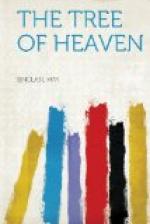It wasn’t—as they all seemed to think—that he was afraid to fight. He had wanted to go and fight for Ireland. He would fight any day in a cleaner cause. By a cleaner cause Michael meant a cause that had not been messed about so much by other people. Other people had not put pressure on him to fight for Ireland; in fact they had tried to stop him. Michael was also aware that in the matter of Ireland his emotions, though shared by considerable numbers of the Irish people, were not shared by his family or by many people whom he knew; to all intents and purposes he had them to himself.
It was no use trying to explain all this to his father and mother, for they wouldn’t understand it. The more he explained the more he would seem to them to be a shirker.
He could see what they thought of him. He saw it in their stiff, reticent faces, in his mother’s strained smile, in his sister’s silence when he asked her what she had been doing all day. Their eyes—his mother’s and his sister’s eyes—pursued him with the unspoken question: “Why don’t you go and get killed—for England—like other people?”
Still, he could bear these things, for they were visible, palpable; he knew where he was with them. What he could not stand was that empty spiritual space between him and Nicky. That hurt him where he was most vulnerable—in his imagination.
* * * * *
And again, his imagination healed the wound it made.
It was all very well, but if you happened to have a religion, and your religion was what mattered to you most; if you adored Beauty as the supreme form of Life; if you cared for nothing else; if you lived, impersonally, to make Beauty and to keep it alive; and for no other end, how could you consent to take part in this bloody business? That would be the last betrayal, the most cowardly surrender.
And you were all the more bound to faithfulness if you were one of the leaders of a forlorn hope, of the forlorn hope of all the world, of all the ages, the forlorn hope of God himself.
* * * * *
For Michael, even more than Ellis, had given himself up as lost.
And yet somehow they all felt curiously braced by the prospect. When the young men met in Lawrence Stephen’s house they discussed it with a calm, high heroism. This was the supreme test: To go on, without pay, without praise, without any sort of recognition. Any fool could fight; but, if you were an artist, your honour bound you to ignore the material contest, to refuse, even to your country, the surrender of the highest that you knew. They believed with the utmost fervour and sincerity that they defied Germany more effectually, because more spiritually, by going on and producing fine things with imperturbability than if they went out against the German Armies with bayonets and machine-guns. Moreover they were restoring Beauty as fast as Germany destroyed it.




